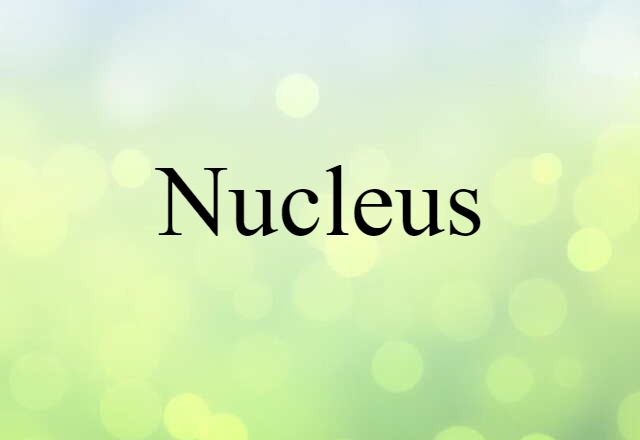- a central part about which other parts are grouped or gathered; core: A few faithful friends formed the nucleus of the club.
- a specialized, usually spherical mass of protoplasm encased in a double membrane, and found in most living eukaryotic cells, directing their growth, metabolism, and reproduction, and functioning in the transmission of genic characters.
- the positively charged mass within an atom, composed of neutrons and protons, and possessing most of the mass but occupying only a small fraction of the volume of the atom.
- a mass of nerve cells in the brain or spinal cord in which nerve fibers form connections.
- a particle upon which condensation of water vapor occurs to form water drops or ice crystals.
- a fundamental arrangement of atoms, as the benzene ring, that may occur in many compounds by substitution of atoms without a change in structure.
- the condensed portion of the head of a comet.
- Phonetics.
- the central, most prominent segment in a syllable, consisting of a vowel, diphthong, or vowellike consonant, as the a-sound in cat or the l-sound in bottled; peak.
- the most prominent syllable in an utterance or stress group; tonic syllable.
- a central or fundamental part or thing around which others are grouped; core
- a centre of growth or development; basis; kernel
- (in the cells of eukaryotes) a large compartment, bounded by a double membrane, that contains the chromosomes and associated molecules and controls the characteristics and growth of the cell
- any of various groups of nerve cells in the central nervous system
- the central portion in the head of a comet, consisting of small solid particles of ice and frozen gases, which vaporize on approaching the sun to form the coma and tail
- the positively charged dense region at the centre of an atom, composed of protons and neutrons, about which electrons orbit
- a fundamental group of atoms in a molecule serving as the base structure for related compounds and remaining unchanged during most chemical reactions
- botany
- the central point of a starch granule
- a rare name for nucellus
- the most sonorous part of a syllable, usually consisting of a vowel or frictionless continuant
- the largest individual that is a mereological part of every member of a given class
















